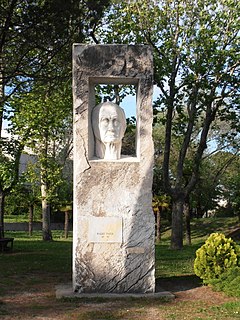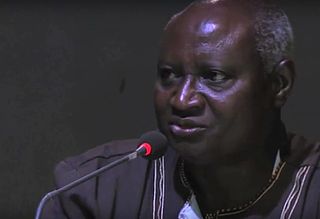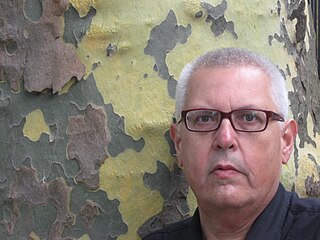
Christian Ide Hintze (December 26, 1953, Vienna - February 2012) was an Austrian poet and performance artist, who focused on the transition from literary to cross-media forms.

Christian Ide Hintze (December 26, 1953, Vienna - February 2012) was an Austrian poet and performance artist, who focused on the transition from literary to cross-media forms.
Between 1972 and 1974 Christian Ide Hintze worked as a Super-8 filmmaker and street singer in Scandinavia, England, France and Spain, between 1974 and 1978 – in addition to studying theater and communications at the University of Vienna – as a distributor of megaphone, poster and leaflet texts in Austria, Germany, Switzerland and Holland. [1] His actions resulted in numerous charges of "obstructing pedestrian traffic" and "contamination of public buildings". [2] In 1976 he was arrested and interrogated by the police in East Berlin. [3] In 1978 he was expelled from the book fair in Stuttgart [4] and convicted of criminal damage in Vienna (for pasting banners, posters and poems onto the Burgtheater). [5] In 1979 the Austrian filmmaker Alfred Kaiser published a film about his work in public spaces. [6]
In the 1980s Hintze undertook several 'pilgrimages' to the Greek island of Lesbos to celebrate his favourite poet, Sappho, [7] and created a series of multi-media poem cycles ("tetralogies"), using "gestures", "graphemes", "phonemes", "audio", and "video" as elements. [8] The works oscillate between semantic and non-semantic structures and are multilingual. [9] They have been presented at ateliers, festivals and public areas and have led to collaborations with Allen Ginsberg, [10] Henri Chopin, [11] Emil Siemeister [12] and Falco. [13] "What Ide aims at is a poetry to be perceived not only with the brain, but also with the whole body; the sensorial poetry, capable of achieving the 'communication monopoly' he had long pined for." [14]
In 1984 Hintze built a poet's temple near the underground station of Karlsplatz in Vienna. The "LI-TE“, a closed-circuit installation in public space, consisted of 4 letter sculptures, a wooden trumpet cross and a hut where the author lived and worked for three weeks. The temple was sponsored by GRUNDIG-Austria and had 3 live cameras and 11 monitors equipped to run the 16 video loops. [15]
"The golden flood", a volume of written poetry that portraits the conditions of vagrancy, appeared in 1987, [16] was translated into several languages and received comprehensive reviews in Germany, Switzerland, Cuba, Vietnam and Argentina. "His searches have something in common with the best "exteriorismo" of Nicaraguan poetry (Cardenal, Coronel Urtecho) or with the striking uninhibitedness of the American "beatnik" movement." [17] "Pindar, Klopstock, Whitman, Rilke, Eliot, Ginsberg, Brinkmann. It is to this tradition that Hintze's book "The golden flood" belongs." [18]
In 1993 Hintze undertook, at the invitation of Miguel Barnet and the Cuban writers’ union UNEAC, a reading tour of Cuba. [19] In the same year he taught, as the first Western author, at the Institute of Literature Nguyên Du in Hanoi (Vietnam). [20] In 1995 he was the first German-language author who taught at the Jack Kerouac School of Disembodied Poetics in Boulder, Colorado (USA). In 1996, he was the co-initiator of the "escuela de poesía" in Medellín (Colombia) [21]
His project "Writing in Water" was realized in 1998 in the spa Oberlaa, Vienna. Hintze wanted to find out whether the emergence of language and phenomena such as rhyme and refrain have something to do with the phylogenetic origin of man out of water. [22]
In 2004 he took part in the Austrian pre-selection show of the Eurovision Song Contest and reached the third place. His contribution, the song "Link Love!", is a statement against racism and for mutual cultural understanding. The text consists of multilingual versions of "I love you". [23]
In 2008 and 2009 he presented his concept of a "7fold poetics" at the Orivesi college of Art, the University of Barcelona [24] and at the Poetry Festival in Oslo. Hintze considers the genesis of poetry to comprise 3 stages (mythical: oral-performative poetry, historical: literary poetry, digital: multi-media poetry) [25] and introduces 7 categories of creation and communication: acoustic, visual, literary, performative, interactive, infrastructural and instructive. [26] "Hintze's unusual theory holds that only after a long period of domination by writing, with the discovery of new media, audio and video tapes, and subsequently of digital technologies and the internet, did poetry return to its roots." [27]
Christian Ide Hintze engages in language policy, propagates lower case writing, [28] organizes cross-cultural events and has run, since 1992, the vienna poetry school. [29] Those who have taught there include Allen Ginsberg, Humberto Ak'abal, Nick Cave, [30] H. C. Artmann, Anne Waldman, Blixa Bargeld, Falco, Wolfgang Bauer, Fernando Rendón, Henri Chopin, Ed Sanders, Ayu Utami and Inger Christensen.
Hintze's works have been presented at festivals and exhibitions in Hall in Tirol (1974), Esslingen (1976), Vienna (1981), Ljubljana (1983), Turino (1984), [31] The Hague (1985), [32] Tokyo (1986), Bern (1987), Buenos Aires (1993), Stockholm (1993), Medellín (1995/1996/2011), [33] Rosario (1996), Berlin (1998), Barcelona (2000), Jakarta (2001), Milano (2007), Novi Sad (2008) and Oslo (2009). [34]

Anne Waldman is an American poet. Since the 1960s, Waldman has been an active member of the Outrider experimental poetry community as a writer, performer, collaborator, professor, editor, scholar, and cultural/political activist. She has also been connected to the Beat poets.

Michael Palmer is an American poet and translator. He attended Harvard University, where he earned a BA in French and an MA in Comparative Literature. He has worked extensively with Contemporary dance for over thirty years and has collaborated with many composers and visual artists. Palmer has lived in San Francisco since 1969.

Digital poetry is a form of electronic literature, displaying a wide range of approaches to poetry, with a prominent and crucial use of computers. Digital poetry can be available in form of CD-ROM, DVD, as installations in art galleries, in certain cases also recorded as digital video or films, as digital holograms, on the World Wide Web or Internet, and as mobile phone apps.
Ernst Jandl was an Austrian writer, poet, and translator. He became known for his experimental lyric, mainly sound poems (Sprechgedichte) in the tradition of concrete and visual poetic forms.

Marjorie Perloff is an Austrian-born poetry scholar and critic in the United States.

Biagio Marin (1891–1985) was a Venetian poet, best known from his poems in the Venetian language, which had no literary tradition until then. In his writings he never obeyed rhetoric or poetics. He only employed a few hundred words for his poems.
Nationality words link to articles with information on the nation's poetry or literature.
Nationality words link to articles with information on the nation's poetry or literature.
Nationality words link to articles with information on the nation's poetry or literature.
Nationality words link to articles with information on the nation's poetry or literature.
Nationality words link to articles with information on the nation's poetry or literature.
Nationality words link to articles with information on the nation's poetry or literature.

Durs Grünbein is a German poet and essayist.

Marcel Beyer is a German writer.

Friederike Mayröcker was an Austrian writer of poetry and prose, audio plays, children's books and dramatic texts. She experimented with language, and was regarded as an avantgarde poet, and as one of the leading authors in German. Her work, inspired by art, music, literature and everyday life, appeared as "novel and also dense text formations, often described as 'magical'." According to The New York Times, her work was "formally inventive, much of it exploiting the imaginative potential of language to capture the minutiae of daily life, the natural world, love and grief".
José Gorostiza Alcalá was a Mexican poet, educator, and diplomat. For his achievements in the poetic arts, he was made a member of the Academia Mexicana de la Lengua.
Anna Aguilar-Amat is a Catalan poet, translator, researcher and university professor in Terminology and Computational Linguistics. She writes primarily in Catalan but also has some work in Spanish. She has a PHD from the Universitat Autònoma de Barcelona where she now teaches Terminology applied to Translation at the Translation Faculty. She published five collections of poems and has received several awards for Catalan poetry. Her poetic work is present in several anthologies of Catalan poets and she has been translated into Spanish, English, French, Italian, Sardinian, Macedonian, Finnish, Arabian, Turkish, Greek, German and Slovenian. She was included in the Anthology New European Poets by Wayne Miller & Kevin Prufer, Minnesota 2008.

Adamou Idé is a Nigerien poet and novelist.
Rei Berroa is a Dominican-American poet, university professor, literary and cultural critic, and translator living in the United States. He has published more than 25 books of poetry, anthologies, translations, and literary criticism.

Víctor Rodríguez Núñez is a Cuban poet, journalist, literary critic and translator.